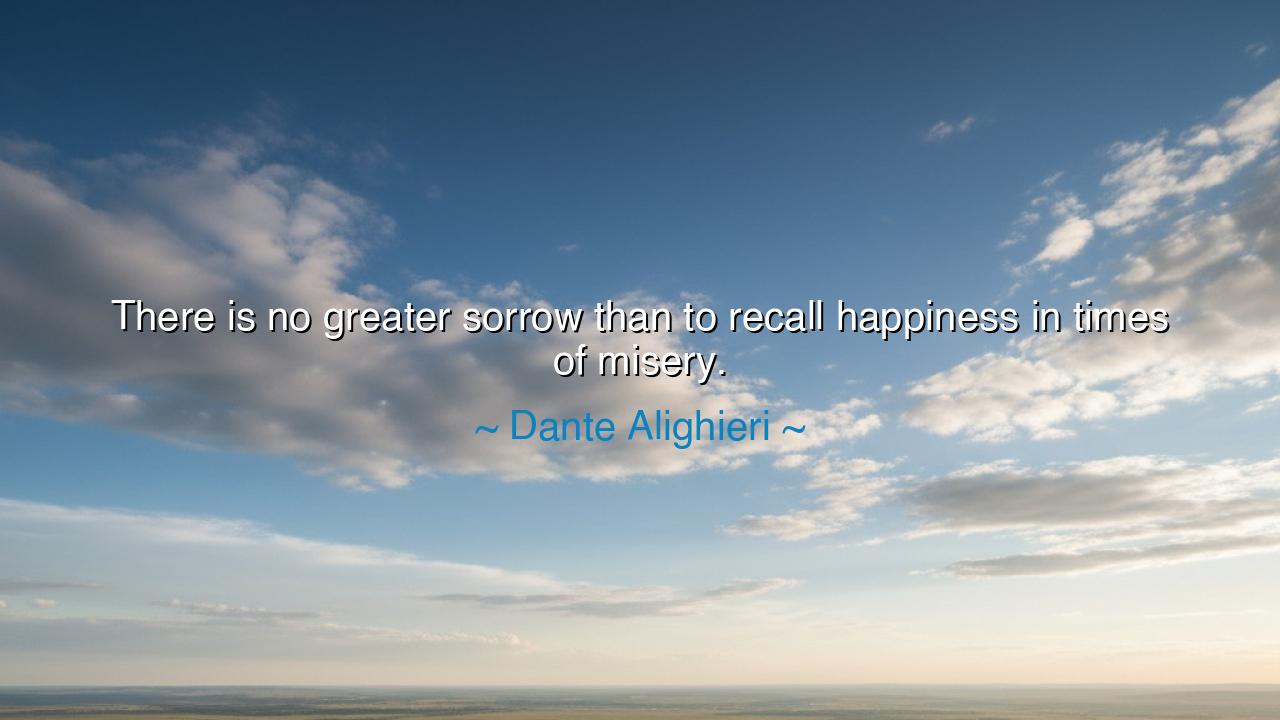
There is no greater sorrow than to recall happiness in times of






“There is no greater sorrow than to recall happiness in times of misery.” Thus wrote Dante Alighieri, the poet of Florence and the pilgrim of eternity, whose words still burn like embers in the hearts of those who have suffered. In this single sentence, drawn from his immortal work The Divine Comedy, Dante reveals a truth as piercing as it is universal: that memory itself, which once brings joy, can become the cruelest torment when the heart is broken. For in the darkness of misery, the remembrance of past happiness is not a comfort, but a mirror — showing the soul what it has lost, what it can no longer touch, what time and fate have stolen away.
The origin of this quote lies in the Inferno, the first part of Dante’s great journey through Hell, Purgatory, and Heaven. There, in the pit of despair, the poet meets the spirit of Francesca da Rimini, who was condemned for the sin of forbidden love. When Dante asks her how she came to her tragic end, she replies with sorrow: “There is no greater pain than to remember happy times in misery.” In her words, Dante captures the anguish of a soul forever haunted by beauty now lost. The memory of love — once pure and radiant — becomes, in Hell, an eternal wound. Through Francesca, Dante gives voice to all who have tasted joy and then been cast into grief, showing that the human heart, though capable of heaven, can also become its own hell through remembrance.
This sorrow, Dante teaches, is not confined to the damned — it is the sorrow of all humanity. To recall happiness while in pain is to feel the cruel distance between what was and what is. It is the ache of the widow remembering laughter at her husband’s side, the exile recalling the fields of his homeland, the fallen leader remembering the days when his name commanded respect. Even the poor soul who once knew love feels this sting most sharply when alone, for memory transforms what was fleeting into something eternal — and the eternal cannot be forgotten. Thus, joy remembered in sorrow becomes both a blessing and a curse: a light from the past that now burns rather than warms.
Yet there is also wisdom in Dante’s lament. The sorrow of memory teaches the soul humility — the recognition that all earthly things are impermanent. It is in this grief that we learn the fragility of happiness, and, by learning it, we may come to treasure it more deeply while it lasts. The ancients taught that nothing is permanent but change; Dante shows us the emotional truth of that law. Even kings and heroes must lose, and even lovers must part. But those who remember rightly — not with bitterness, but with gratitude — may find redemption in their pain. For memory, when purified of self-pity, becomes not a torment but a teacher.
Consider the story of Helen Keller, who was struck by blindness and deafness at the age of nineteen months. For years she lived in silence, unable to recall the sounds of her early joy, and yet, through patience and perseverance, she found new ways to connect with the world. Though she might have succumbed to despair, she transformed her loss into light. Her misery, instead of destroying her, awakened compassion and wisdom. She once said, “Although the world is full of suffering, it is also full of the overcoming of it.” Her life proves that the heart, though it suffers from recalling lost happiness, can still create new joys from its ashes.
Dante’s words, then, are both a warning and a revelation. They remind us that happiness is fragile, and that to live wisely, we must hold it with reverence. Yet they also reveal that even misery has meaning. For through sorrow, we come to understand the depth of our own capacity to feel — to love, to long, to remember. The pain of recalling happiness is proof that joy once lived within us; it is the echo of love’s song still resonating, though the music has faded. To feel such pain is not weakness, but testimony to the greatness of the human heart.
Therefore, my children, learn from Dante’s wisdom. When sorrow visits you, and memory stirs the ache of what was lost, do not curse your heart for feeling. Instead, thank it — for only a soul capable of deep happiness can also feel deep sorrow. Let your memories remind you that life, though fleeting, is worth cherishing. Do not seek to banish pain by forgetting joy, but transform it by living again with purpose. Seek beauty even amid ashes, and let love — though wounded — guide you forward.
And remember these immortal words: “There is no greater sorrow than to recall happiness in times of misery.” Yet even in that sorrow lies a hidden strength — the strength to remember that you once lived, once loved, once soared. Carry that memory not as a burden, but as a flame — fragile, yes, but eternal — to light your way through every darkness, until joy, in some new form, returns again.






AAdministratorAdministrator
Welcome, honored guests. Please leave a comment, we will respond soon